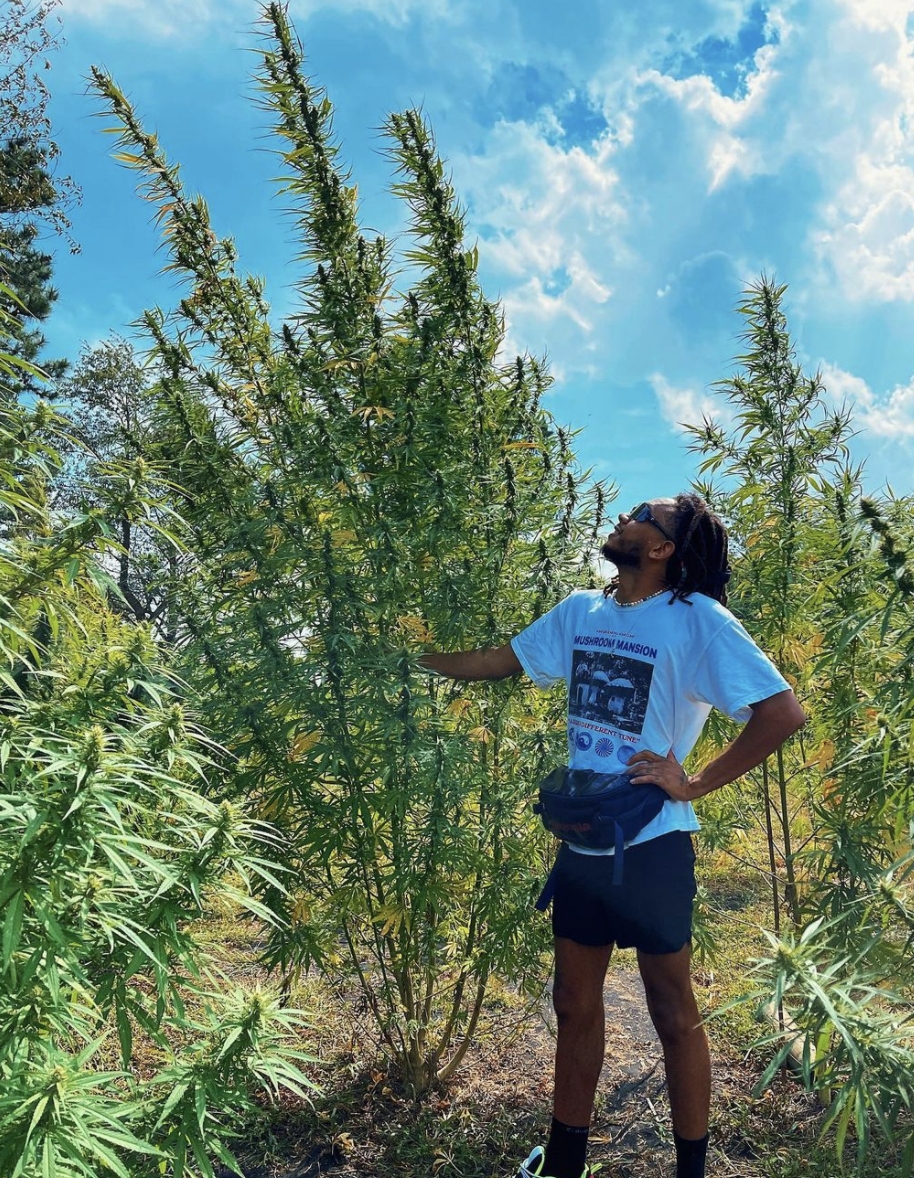For William Padilla Brown (@mycosymbiote), happiness is the alleviation of preoccupation. And nothing preoccupies him more than anxiety over the environment. So he’s dedicated his life to creating a world that is ecologically sound. A world where humans and the planet coexist harmoniously.
Not a bad ambition to have, right? And Brown is tireless in the pursuit of his lofty goal.
In his community, Brown is known as Cosmic, the Permaculture Papi, Mycosymbiote, or simply Will. The self-taught multidisciplinary scientist and mushroom educator voraciously studies how different organisms — most notably fungi — can help us create a more sustainable planet. But he sees implications that are even larger. Freedom from environmental peril is just one piece of building a fully liberated world. He also wants to see a planet free of centralized power sources and a monetized education system.
To that end, Brown often gives content away via his website, Youtube channel, and various social media platforms. He provides inexpensive resources and supplies for growing spirulina (nutrient-dense, edible blue-green algae), mushroom cultivation, and sustainable models for small-scale gardening. He’s also well known for authoring two books on the cultivation of cordyceps mushrooms, the first books on the subject written in English.
The latter work is, above all things, is the largest driver of Brown’s rapidly growing notoriety. Cordyceps mushrooms have taken the spotlight in the medicinal mushroom world recently, for their energy-enhancing properties and use as a “brain boosting” supplement. They’re also incredibly expensive (~$120 ounce) and information on growing them is hard to come by.
Or was, until Brown’s The Cordyceps Cultivation Handbook literally blew the doors off.
“Right now the sensationalism is around mushrooms,” Brown says, reflecting on his open-source philosophy and highly accessible methods. “But every approach I have taken to all aspects of my work has been a low-tech approach due to the fact that I am not heavily funded. I am an everyday person because of my socioeconomic status.”
Like a true multi-disciplinarian, Brown’s work takes on numerous forms. But there is a throughline: mega-labs are not the target market. His guides are for the people.
“All my approaches are created through the lens of permaculture design,” he says. “So the algae system I created, the gardening system, the 3d printing recycling facility system — all designed ready for individuals to take control and action of their own lives within their communities.”
For some scientists, work is a solitary pursuit. It’s them in a lab and culminates with the publication of a paper which is read and responded to by other scientists. But Brown — who once called himself a “graduate of Google Scholar” and dropped out of high school — sees teaching and sharing know-how as a cornerstone of his work.
“I knew If I spent my time teaching other people how to perform more ecologically regenerative tasks, that could provide them with jobs but also create a world where people are more freed to follow their passions,” he says.

At its root (or mycelia, to stay on theme with mushrooms), Brown focuses most of his work on teaching others to learn to grow their own food and medicine because he believes that the biggest ecological threats we face are centralized macro-industries. By putting the means of production for something with the pharmacological and health benefits of various fungi in the hands of his community, he’s also doing his part to de-stabilize giant agro-businesses.
It’s an act of rebellion and altruism in one.
“By providing people with models, systems, and standards of practice for ecologically regenerative work and making the work open source so that anybody can access it, then anybody can begin doing jobs that inherently benefit the ecosystem,” Brown says.
This desire to hand-off knowledge serves a dual purpose. It helps communities and helps create knowledge-holders, allowing Brown to remain eclectic in his own pursuits. A true polymath, he’s always looking toward the next step in the ecological revolution. Right now, his primary goal is a mushroom farm, which he hopes will develop a capacity to sustainably employ other would-be mycologists. Certainly, the appetite for these jobs exists right now, more than ever.
“As we move forward, as more media is published around this kind of work, thankfully there are more people interested in supporting this work,” Brown says. “More and more people are interested in growing mushrooms and cooking with them, which is great for the industry.”
Whether speaking about cordyceps, psychedelics, or other mushrooms, he feels certain the next wave in the movement will be the creation of boutique micro industries.
“I know there is going to be an incredibly valuable market for the individuals producing on a local scale,” he says. “I encourage people to explore their own passions and find what is valuable and niche in their own regions.”
It’s an idea that sounds both down to earth and absolutely revolutionary. And perhaps this is Brown’s greatest skillset — the ability to create practical, affordable, viable, small-scale solutions that also carry some level of cosmic importance. It’s a talent as magical as mushrooms themselves and goes a long way to explaining why his sky-high goals don’t seem ridiculously out of reach.
“Being true to yourself is the biggest gift you can bring to the world,” Brown says, reflecting on his unique path. “As an individual studying molecular biology I fully understand that each one of us, down to our DNA, has something unique to bring to the world that nobody else can duplicate.”
William Padilla Brown Shares Three Easy Ways To Help The Environment TODAY.
- Shift your diet to local seasonal foods.
- Figure out where your drinking water is coming from–and stop using plastic bottles.
- Go into nature with as many people that you love as you can, as often as you can.

